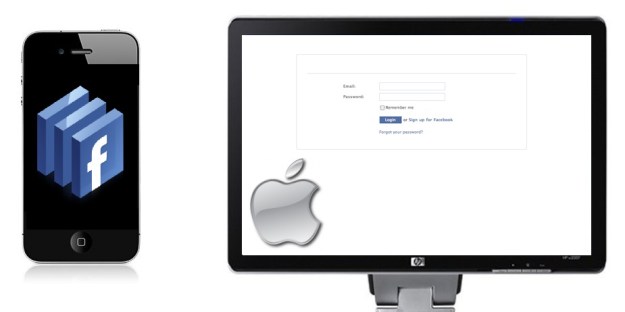 Apple and Facebook are two Silicon Valley titans that have a stranglehold on the digital world. And until quite recently, it seems like they have each been content to dominate their respective arenas of technology: Apple’s being mobile and Facebook’s being social. Of course every Web 2.0 company understands the need to not be the best at one thing but at least try to be the best at everything, and recent projects from Apple and Facebook that have surfaced reveal they are both taking this to heart. Looks like some toes are about to get stepped on.
Apple and Facebook are two Silicon Valley titans that have a stranglehold on the digital world. And until quite recently, it seems like they have each been content to dominate their respective arenas of technology: Apple’s being mobile and Facebook’s being social. Of course every Web 2.0 company understands the need to not be the best at one thing but at least try to be the best at everything, and recent projects from Apple and Facebook that have surfaced reveal they are both taking this to heart. Looks like some toes are about to get stepped on.
Facebook gets mobile

Adding to Facebook’s mobile mix is this Project Spartan business. Facebook is allegedly planning to redesign its apps for the mobile Safari browser via HTML 5. The assumption here is that the social network wants to take away some of the strength Apple’s App Store gives it over mobile while also giving users a way to access apps on mobile browsers. A Facebook Web app store has possibilities, but call us skeptics for the time being. But if anything, it’s an indication Facebook isn’t totally content playing second fiddle.
Apple gets social

Right off the bat, this doesn’t seem as fluid a step as Facebook’s mobile-photo project does. There have been third party apps with similar concepts that have been passed off as creepy or raise privacy concerns. Of course, being an official iOS app means it will bear more weight with users, but after Locationgate, not every Apple aficionado is as trusting with this information. That said, it has promise: The immediate fanfare social app Color received was due to its technology and revolutionary way of seeing social networks in relation to geography. If Apple can harvest this idea and avoid Color’s missteps, the app could find a fast following. And the very things that Color got wrong, Apple notoriously gets right. Simple, intuitive UI, well-executed product launches, automatic user base. Color co-founder Peter Pham (who recently left the company), a former employee of Apple, praised its self-explanatory applications and UIs, saying Color wanted to mimic this – something it wasn’t able to do, partially contributing to its user isolation. And the fact that Color hasn’t been able to build a database of loyal years means the app hasn’t be able to work as it should, and everything iOS comes with hoards of fans willing to try its services at launch.
Are Apple and Facebook stepping into the ring?
Just because Apple and Facebook have respective social and mobile aspirations, does it mean the two are about to become enemies? There are two of the most powerful companies in the world that also happened to have a bit of a past. There was some documented fallout after Facebook pulled integration with Apple’s Ping service, and there have been ample undocumented whispers about remaining tensions between these two ambitious companies. An all-out public airing of grievances a la the Facebook-Google data wars fiasco seems unlikely, as both Facebook and Apple tend to keep their business cards close to their chests. But it’s clear that being the best at one thing isn’t good enough, and each know that mobile and social platforms and applications are only going to continue dominating the digital landscape. Having a tight grip on one simply isn’t enough.
Editors' Recommendations
- Everything you need to know about the massive Apple App Store outage
- Apple just released iOS 17.4. Here’s how it’s going to change your iPhone
- How to reset your Apple password on iPhone or web
- Apple Music Replay 2023: how to find your replay experience
- Apple finally fixed my biggest problem with the iPhone 14 Pro Max

